

Last updated on

Are you interested in exploring alternative search engines and chatbots? Here’s an in-depth analysis of various options, allowing you to experiment with each and gauge how it enhances your search endeavors.
For the past two decades, Google has reigned as the go-to search engine for everyday queries, product investigations, and staying abreast of current events.
Given its dominant position, Google has been the primary focus for SEO and marketing practitioners.
However, with the advent of ChatGPT and Bing Chat, there have been reports of Google founders Larry Page and Sergey Brin reengaging to integrate chatbot functionalities into Google Search.
Around May 2023, Google unveiled the chatbot Bard and the Search Generative Experience (SGE) within Google Search. Presently, Google SGE is exclusively accessible in Google Labs, with potential wider availability later this year.
The forthcoming years in search engine evolution promise to be intriguing.
Regardless of future developments, several alternative search engines boast unique advantages over Google, including bolstered privacy measures, specialized content, distinct algorithms, and customized user interfaces.
Below, you’ll find a curated list of 20 exceptional alternative search engines worth exploring.
When search engines integrate AI chatbots built on large language models, they can occasionally generate errors and even produce hallucinatory responses.
It’s essential to validate crucial information obtained from AI-driven search engines, particularly in areas such as medical advice, financial guidance, legal matters, and safety precautions, by consulting reliable and authoritative sources.
[Editor’s note: The creation of content through generative AI methods is entangled with various unresolved legal considerations. It’s advisable to refrain from presenting generative AI-generated outputs as original content.]

By December 2023, Microsoft’s Bing sites accounted for 7.1% of all search queries in the United States.
An argument can be made that Bing surpasses Google in various aspects.
To begin, Bing offers a rewards program where users can earn points through searches, which can then be redeemed at Microsoft and Windows stores, adding value for users.
From my perspective, Bing’s visual search API stands out as superior to its competitors and is notably more user-friendly.

Bing extends its clean user interface to video searches, providing a non-biased alternative to YouTube.
On February 7, 2023, Bing unveiled an entirely new, AI-driven iteration of its search engine, initially dubbed “Bing Chat” and now known as Copilot. The stated objective is to enhance search capabilities, provide comprehensive answers, introduce a new chat experience, and facilitate content generation.

According to Satya Nadella, Microsoft’s chairman and CEO, despite 10 billion daily search queries, approximately half remain unanswered, a gap Bing aims to address.

Established in 2022, Perplexity.ai presents an innovative alternative to Google, boasting 10 million monthly active users and offering contextually rich answers.
Diverging from conventional search engines that primarily link to webpages, Perplexity.ai operates as a chatbot, furnishing direct responses to inquiries by referencing sources for information retrieval, with an option for follow-up questions.

This functionality enables users to explore their initial queries further through subsequent related questions. Emulating a conversational style, this interactive approach facilitates refined searches, resulting in more precise answers.
The evolving dialog-based search experience distinguishes Perplexity.ai as an appealing option for users seeking a more intuitive and responsive search tool. Below, Tobi Lütke, CEO of Shopify, shares feedback on Perplexity.ai.

However, as it employs Language Model (LLM) technology for answer extraction, there’s a risk of hallucination, potentially leading to incorrect or misleading answers.
You.com, an AI-driven search engine, was established by Richard Socher, a distinguished researcher in natural language processing (NLP) and former chief scientist at Salesforce.
The platform operates in two distinct modes: personal and private. In personal mode, users have the flexibility to customize their source preferences, tailoring their search experience to their individual needs. Conversely, private mode ensures complete anonymity, with no telemetry data being logged.
Additionally, the company offers a range of supplementary features, including a Chrome extension, AI-powered image generation, and YouWrite, an AI-based writing assistant.
By fostering an open search platform, You.com actively encourages developers to create applications and contribute to a more transparent and collaborative internet ecosystem.

Yep.com, developed by Ahrefs, positions itself as a search engine with a unique focus on user privacy, refraining from tracking or selling user data.
Instead of compiling personal profiles for targeted advertising, Yep.com tracks the frequency of specific word searches and the popularity of links based on clicks.
The platform operates on a 90/10 revenue share model, where 90% of advertising revenue directly benefits content creators. This model enables creators to earn money for their contributions and encourages users to support their favorite creators directly.
By prioritizing user privacy and fair compensation for content creators, Yep.com aims to offer a more transparent and rewarding search experience.

When it comes to sourcing copyright-free content, Openverse should be your top destination. While Google offers a wider array of search results, Openverse distinguishes itself with its extensive and searchable repository of open-source media, spanning images, audio, and videos.
Whether you’re in need of music for a video, an image for a blog post, or any other content without concerns about copyright infringement, Openverse provides a reliable solution.
Mainstream search engines refer to Google alternatives that have consistently maintained a respectable market share over the years.
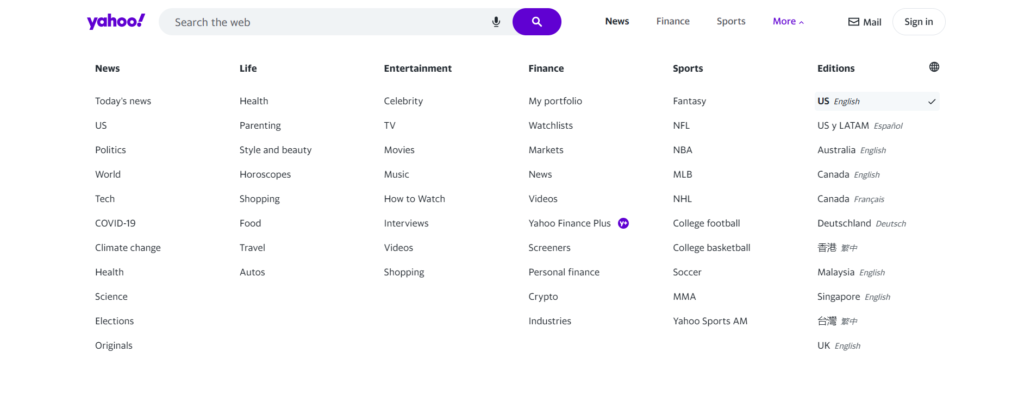
As of December 2023, Yahoo.com (under Verizon Media) held a 2.37% search market share in the US.
Yahoo’s forte lies in its diversification strategy, providing an array of services including email, news, finance, and more alongside its search function.
With a history spanning over two decades, Yahoo has continuously innovated and adapted to changing trends.
On January 20, the company cryptically tweeted about revitalizing the appeal of search, but did not respond to inquiries seeking clarification on this statement.


Ecosia sets itself apart with its core mission of utilizing advertising revenue for environmental causes, particularly tree planting initiatives. As a non-profit organization, it allocates 100% of its profits towards environmental conservation efforts, working closely with local communities to plant and maintain trees worldwide.
In collaboration with Microsoft’s Bing, Ecosia leverages its search index and web advertisements, maximizing its impact. Additionally, it provides a browser extension for seamless access to its search engine, facilitating quicker and more convenient searches for users.

AOL Search, one of the pioneering search engines on the Internet, holds a modest market share of 0.08% in the US.
To power its search results, AOL relies on partnerships with Google and Bing.
In contrast to Google’s expansive scope, AOL emphasizes curated content, giving priority to news, entertainment, and a blend of AOL-owned, syndicated, and external website results.
While AOL does track user data to personalize advertising, its approach is perceived as less sophisticated compared to Google. Rather than building highly detailed individual profiles, AOL’s targeting focuses more on broad demographics and interests.
Privacy is becoming a paramount concern for internet users.
Privacy-focused search engines prioritize the privacy of their users by abstaining from tracking their activities or collecting personal data.
Some of the most popular ones include:
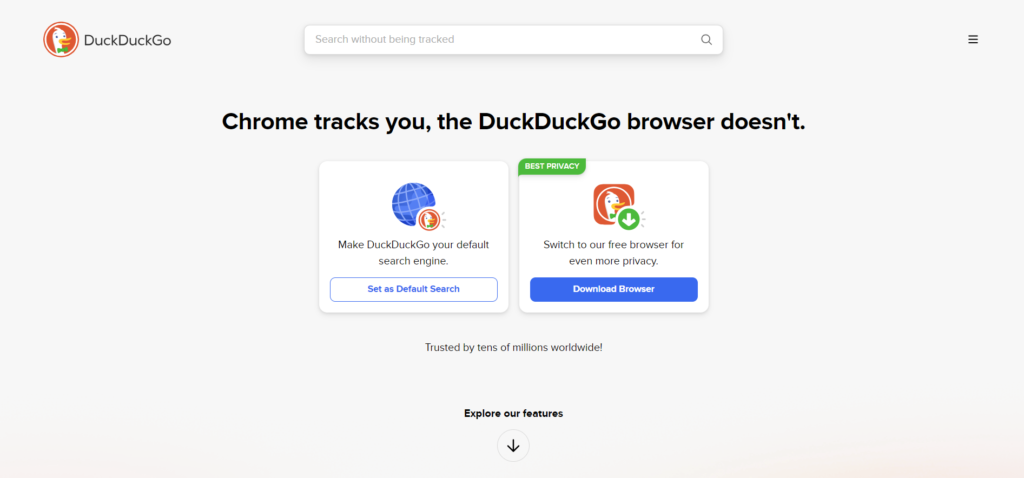
As of December 2023, DuckDuckGo captured a 1.77% search market share in the United States.
DuckDuckGo distinguishes itself as a search engine that could fit into the mainstream category, but its primary appeal lies in its commitment to user privacy. Unlike Google, which extensively collects user data to tailor search results and ads, DuckDuckGo refrains from tracking or storing any personal information of its users. This means that your activity on DuckDuckGo remains completely anonymous.
Due to its privacy-centric approach, DuckDuckGo does not track search history or create user profiles. Consequently, it does not offer filter options based on a user’s search history profile, and there are no persistent targeted ads.
This ensures that users can conduct their searches without concerns about their privacy being compromised.
DuckDuckGo is an ideal choice for individuals who prioritize keeping their browsing habits and personal information private.
DuckDuckGo Lite serves as the mobile version of the search engine.
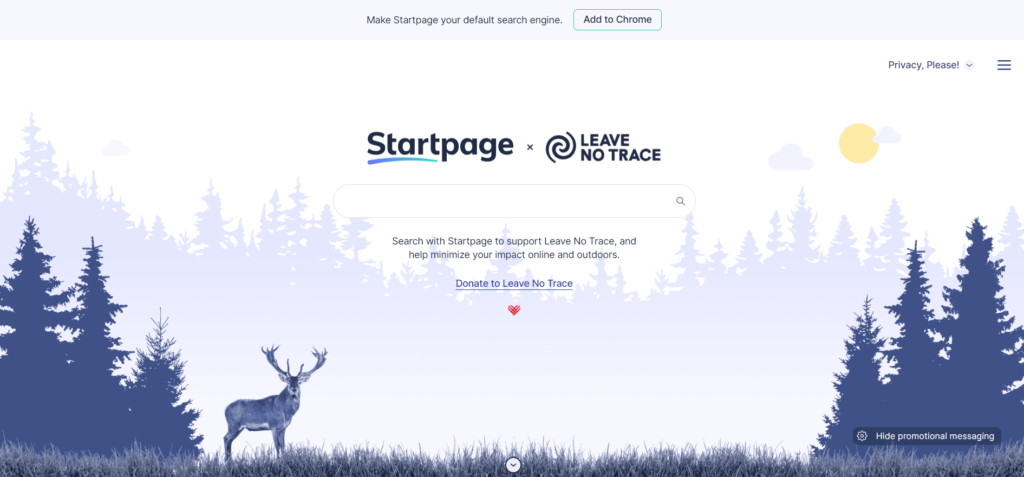
Startpage operates as a search engine aggregator, meaning it doesn’t conduct its own web crawling. Instead, it adopts a metasearch approach, gathering results from various search engines such as Google, Bing, DuckDuckGo, among others, and prioritizing links that are common across all sources.
This makes Startpage an excellent option for users who appreciate Google’s search results but are wary of having their search history tracked and stored.
In addition to its privacy-focused search capabilities, Startpage offers several other features including a URL generator, proxy service, and support for HTTPS. The URL generator, in particular, is noteworthy as it eliminates the need for cookie collection by remembering user settings in a manner that preserves privacy.

Swisscows stands out as a distinctive choice among search engines, positioning itself as a family-friendly semantic search engine. While it relies on Bing for its web search functions, Swisscows has also crafted its own index specifically for the German language edition.
Moreover, Swisscows places a strong emphasis on user privacy, pledging never to collect, store, or track data. Leveraging artificial intelligence, it adeptly discerns the context of users’ queries.
As users interact with Swisscows over time, the search engine promises to deliver answers with remarkable accuracy, enhancing the search experience.
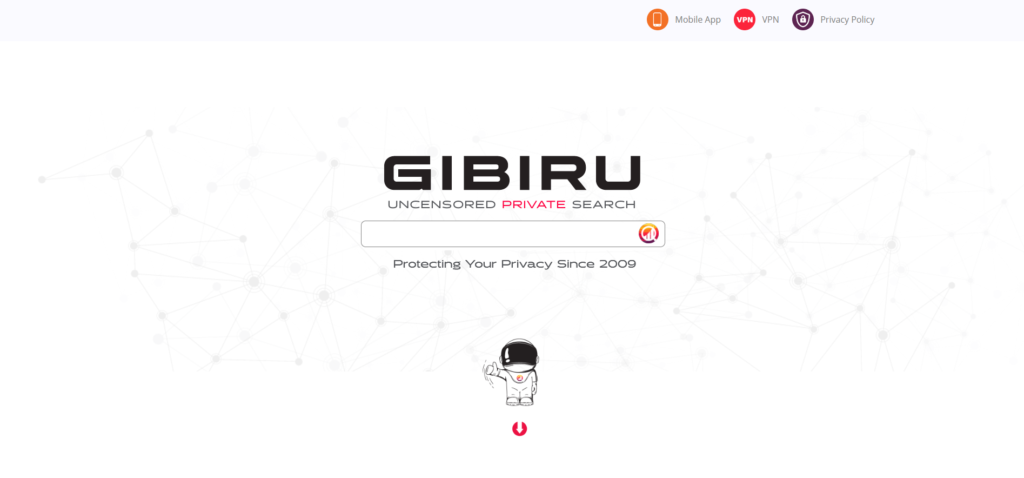
Gibiru offers “Uncensored Private Search” as stated on its website, ensuring no retargeting or selling of private data. It asserts that its search results stem from a customized Google algorithm, thereby allowing users to query information without concerns about Google’s tracking practices.
The search engine earns commissions when users make purchases or engage with its search results, maintaining its privacy-centric ethos by abstaining from using personal data for advertising purposes.

In 2023, Brave Search achieved complete independence from other search engines, including Bing, and now operates solely on its own index. This move underscores its commitment to prioritizing user privacy and transparency in search results.
Brave Search has seen remarkable growth, boasting 24.57 million daily active users as of January 2024. This surge in popularity reflects the increasing demand for privacy-focused search engines.
The platform offers a range of features, including free video calls, offline playlists, and a customizable news feed. Additionally, users can benefit from advanced security measures such as IPFS integration, Tor (Onion Routing), and a crypto wallet.
Brave incentivizes users to opt into privacy-preserving ads by offering rewards. With over 65 million people using its browser each month, Brave aims to provide a faster and safer web experience for its users.

Wiki.com aggregates its search results from thousands of wikis across the internet. It serves as an ideal search engine for individuals who value community-driven information, akin to what is found on platforms like Wikipedia.

X is unparalleled as a real-time search engine, making it the go-to destination for minute-by-minute updates, particularly during emergencies. While Google may eventually catch up, nothing surpasses the immediacy of a tweet in critical situations.
To fully leverage X’s capabilities, explore our guide to X/Twitter Advanced Search.

SlideShare provides a platform for searching and accessing documented slideshow presentations, as well as ebooks and PDFs. This makes it an invaluable tool for individuals preparing business presentations or seeking informative resources.
Additionally, SlideShare offers the functionality to save individual slides and download entire slideshows for offline use on your local computer.

The Internet Archive, also known as the Wayback Machine, is renowned for its capability to research old websites. However, its utility extends far beyond this.
True to its name, the Internet Archive offers access to an extensive collection of documented material, encompassing millions of free videos, books, music, and software.
In essence, the Internet Archive serves as an expansive online library, providing access to a diverse range of content across various formats.
Specialized search engines cater to specific needs, offering results tailored to particular criteria. For instance:
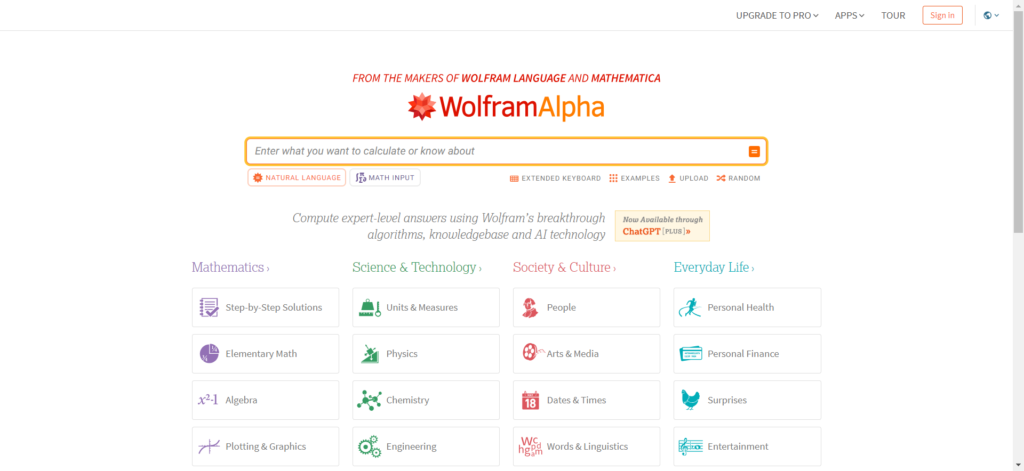
WolframAlpha stands out as a computational knowledge engine, enabling users to compute answers to problems and access expert-level data across a wide array of subjects, ranging from algebra to linguistics.
In addition to its basic functionalities, WolframAlpha offers Pro features tailored for individuals, students, and educators who require professional-grade computation and analysis of imported data.
Subscription pricing for WolframAlpha Pro starts at $5.49 per month, providing enhanced capabilities and tools for users seeking advanced computational solutions and data analysis.

LinkedIn, renowned for its professional networking capabilities, is increasingly utilized as a business-oriented search engine, with a staggering 61 million searches conducted on the platform each week.
The search algorithm on LinkedIn for organizations prioritizes the uniqueness and specificity of an organization’s LinkedIn Page name. Generic names often yield broad and less relevant results. For instance, an organization named “Innovative Tech Solutions” is likely to rank higher than one named “Professional Technology Services” due to the uniqueness of its name.
However, excessive keyword usage in a profile can backfire, triggering spam detection algorithms and adversely affecting search visibility.
The algorithm also takes into account factors such as the number of Page followers, connections between the Page and the searcher, the activity level on the Page, and the relevance of search terms in the organization’s name ratio.
International search engines are tailored to specific regions, offering search results that reflect local language and culture.
Some popular examples of international search engines include:

Baidu, the largest search engine in China, dominates the market with a commanding 66% share.
Similar to Google, Baidu provides a comprehensive suite of services, encompassing maps, music, videos, and an app store.
Additionally, Baidu offers a mobile browser and a dedicated mobile app to cater to the needs of its extensive user base.

Yandex is the preferred search engine for over 69% of Russian internet users and is also widely utilized in Belarus, Kazakhstan, Turkey, and Ukraine. Known for its user-friendly interface, Yandex offers a seamless search experience.
In addition to its search capabilities, Yandex provides a suite of impressive tools to enhance user experience.
However, in January 2023, Yandex experienced a data leak, sparking speculation about the significance of the information exposed.

Sogou, a Chinese search engine, is gaining traction and currently holds a 5% market share in China. Sogou Search offers a wide array of interactive features, including support for WeChat, article search, English search, translation services, and more.
The platform emphasizes its commitment to delivering professional, precise, and user-friendly search experiences, achieved through the implementation of self-developed artificial intelligence algorithms.

Naver is a widely used search engine in South Korea, commanding a significant 34% market share in the country. It boasts a diverse range of services, encompassing blogs, news, music, and shopping.
The platform also provides a convenient mobile app for on-the-go searching, making it an excellent option for those seeking a search engine tailored to the Korean market.
While Google remains the top choice for many users, alternative search engines can offer distinct advantages, such as a more tailored search experience and enhanced privacy features.
It’s worth exploring these alternatives to see if they better suit your needs and preferences.
Original news from SearchEngineJournal